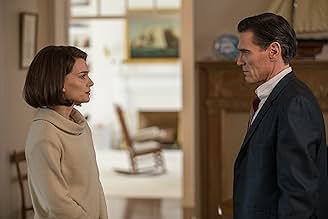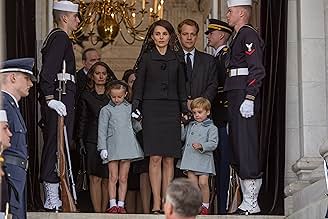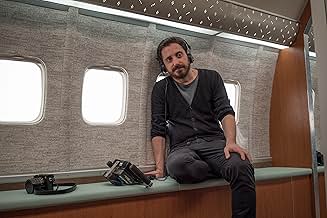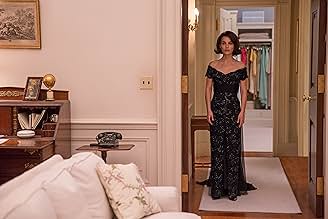IMDb रेटिंग
6.6/10
86 हज़ार
आपकी रेटिंग
राष्ट्रपति John F. Kennedy की हत्या के बाद, प्रथम महिला Jacqueline Kennedy Onassis लड़ती है।राष्ट्रपति John F. Kennedy की हत्या के बाद, प्रथम महिला Jacqueline Kennedy Onassis लड़ती है।राष्ट्रपति John F. Kennedy की हत्या के बाद, प्रथम महिला Jacqueline Kennedy Onassis लड़ती है।
- 3 ऑस्कर के लिए नामांकित
- 44 जीत और कुल 170 नामांकन
फ़ीचर्ड समीक्षाएं
I'm not really familiar with Pablo Larraín's work. I hadn't seen any of his other films prior to watching Jackie. And yet I was still very excited for it because it sounded like something that was absolutely my cup of tea. Hearing reports that Academy members weren't liking it very much, and then hearing exactly why (because it wasn't your usual biopic and seemed to be more "out there" than most biopics) just got me more excited. It didn't disappoint at all. It was basically everything I wanted it to be. One of the finest, truest character studies of the year, completely driven by explorations into Jackie Kennedy's psyche. That sounds kind of pretentious, but I do think this film more than any other of the year deserves to be described that way. I would absolutely not be surprised if the Academy doesn't go for this at all, but I do wish it was popping up in more critic awards than it has been. More than any other film of the year it rests completely on its lead actress. Portman is just completely engaging and mesmerizing, and she adds to the film's poetry-like storytelling. Having seen both Portman and Emma Stone, I would be surprised if they gave the Oscar to Stone simply because Portman is basically her entire film and she's also completely immersed into the character in a way that Stone doesn't need to be. The latter's role may just be too light. Regardless, it's a performance to be talked about and remembered.
I appreciate when I leave a film feeling as though there's still so much left to unpack and to uncover about it, meaning that I wasn't able to completely discover all of its aims and goals in one viewing. To me that's the sign of a very well thought out film, a film that will leave a lingering impact. That's exactly how I came out of this. I'm sure not everyone here will take to it, but count me as one of its fans.
I appreciate when I leave a film feeling as though there's still so much left to unpack and to uncover about it, meaning that I wasn't able to completely discover all of its aims and goals in one viewing. To me that's the sign of a very well thought out film, a film that will leave a lingering impact. That's exactly how I came out of this. I'm sure not everyone here will take to it, but count me as one of its fans.
As someone who loves history, I thoroughly enjoyed Jackie. For the most part, the facts were historically accurate as far as I am aware. I also really liked the score, I thought it was very refreshing and simply different. The film was slow-paced but I find that's to be expected with historical films. I liked that the cinematography was simple to give a real sense of the era, and the costume design was great. I also liked the ending.
Essentially this is a film where I liked everything, but didn't love much. The only things that I absolutely loved was Natalie Portman's acting as Jackie Kennedy. She really exuded her character and became Jackie Kennedy. it was great! The other thing I loved was John Hurt as the priest which was a lovely surprise.
Overall, this was a simple film but it wasn't daring. It didn't risk take like other films would and therefore in that regard may be a bore for some.
Essentially this is a film where I liked everything, but didn't love much. The only things that I absolutely loved was Natalie Portman's acting as Jackie Kennedy. She really exuded her character and became Jackie Kennedy. it was great! The other thing I loved was John Hurt as the priest which was a lovely surprise.
Overall, this was a simple film but it wasn't daring. It didn't risk take like other films would and therefore in that regard may be a bore for some.
The Kennedy assassination was one of the defining moments of history, probably the most internationally shocking one until 9/11. Pablo Larraín's "Jackie" focuses on the widowed Jackie Kennedy during the few days after the assassination, as she tries to cement her late husband's legacy. I wasn't alive then, so I don't know what Jackie's voice sounded like, but Natalie Portman affects a breathy mid-Atlantic accent to play the stylish first lady. Quite an impressive performance.
We could make the argument that JFK didn't have much of a positive legacy, given his poor record on civil rights (upon which Johnson sought to improve) and an undeclared war on Cuba. Even so, the era was seen as the culmination of the possible. I recommend the movie.
Larraín also directed 2012's "No", about the TV campaign that led to Augusto Pinochet's defeat in the 1988 election.
We could make the argument that JFK didn't have much of a positive legacy, given his poor record on civil rights (upon which Johnson sought to improve) and an undeclared war on Cuba. Even so, the era was seen as the culmination of the possible. I recommend the movie.
Larraín also directed 2012's "No", about the TV campaign that led to Augusto Pinochet's defeat in the 1988 election.
Being a history and film buff I had to see "Jackie" as it's a historical film of the memories and times of the life and assassination of President John Kennedy, as told thru flashback and grief trauma memories from the elegant and class act first lady Jackie Kennedy(in a beautiful performance from the wonderful Natalie Portman). Starting like an interview style of a film told by flashback flashback the movie takes place after the death of "JFK", as Jackie is interviewed about the experience and the memories of the death and the impact of the administration, all of this brings out sorrow and emotions from Jackie(as Natalie showed the grief and anger on screen so well)it's just like you as the viewer feel the pain of the first lady. Overall good film that's a showcase of memories showing how tragedy and loss can affect a strong lady along with a nation, this picture is a watch for any history or film buff.
Pablo Larraín's "Jackie" covers the week following the JFK assassination in 1963 and is based on an unpublished interview of Jacqueline Kennedy (Natalie Portman) by Life Magazine. Finally released upon her death, the notes were blended with several other interviews to create this screenplay by Noah Oppenheim. For anyone interested in understanding the widespread panic and "what-now" of the time, you'll appreciate this film.
The scene ideas are painfully simple, though highly effective. From sharing the impossible news with her kids, to deciding when/how to move out, to asking million-dollar questions of the priest ("What kind of God takes a father away from his two little children?"), the movie includes moments we all know must have happened to Jackie but were buried under the public hysteria around the event itself. As intoned by the funeral planner, "The world's gone mad."
Jackie makes small talk in the hearse with Bobby Kennedy while her dead husband (his dead brother... America's dead president) lies in the hulking casket between them, causing our focus to oscillate between the weight of what we hear and what we see. Later, as she staggers through the White House at the end of the longest day of her life - still donning her blood-soaked pink dress that would soon find a permanent home in infamy - Jackie personifies crippling isolation in body and in mind. The non sequiturs that tumble out during these dreadful sequences ("How will we afford to put the kids through school now? Maybe we can sell some of the furniture?") are as heartfelt as they are ludicrous. No matter where she is or what she's doing, Jackie reacts like any commoner would. She just happens to be doing so as the First Lady.
The film works because Portman is the most believable Jackie O ever put on screen. From the outset, she is in total control of her confusion, fear, helplessness, exasperation, guilt, long-held duties as a mother, brand-new duties as a *father, alongside her esoteric responsibilities to the nation. Portman puts on an acting clinic by conveying her predicament through nuance. We learn as much about Jackie's state of mind from what she doesn't say as from what she does, because no matter how carefully she speaks or how badly she wishes to be understood, it becomes clear that no words could ever meet the moment.
Characters often stare pleadingly into the camera's eyebrow, as if searching for an escape hatch from the audience. The score is populated by discordant whole notes that produce similar unease. Even the photography is at once stunning and unsettling, given the underlying darkness that has eclipsed the light of society. In the end, we feel the world on edge, suspended in time, waiting for normal life to resume. This film concerns the looking back required before it is possible for Jackie Kennedy (or for any of us) to make sense of the loss and start again. The same looking back required "to let them see what they've done."
The scene ideas are painfully simple, though highly effective. From sharing the impossible news with her kids, to deciding when/how to move out, to asking million-dollar questions of the priest ("What kind of God takes a father away from his two little children?"), the movie includes moments we all know must have happened to Jackie but were buried under the public hysteria around the event itself. As intoned by the funeral planner, "The world's gone mad."
Jackie makes small talk in the hearse with Bobby Kennedy while her dead husband (his dead brother... America's dead president) lies in the hulking casket between them, causing our focus to oscillate between the weight of what we hear and what we see. Later, as she staggers through the White House at the end of the longest day of her life - still donning her blood-soaked pink dress that would soon find a permanent home in infamy - Jackie personifies crippling isolation in body and in mind. The non sequiturs that tumble out during these dreadful sequences ("How will we afford to put the kids through school now? Maybe we can sell some of the furniture?") are as heartfelt as they are ludicrous. No matter where she is or what she's doing, Jackie reacts like any commoner would. She just happens to be doing so as the First Lady.
The film works because Portman is the most believable Jackie O ever put on screen. From the outset, she is in total control of her confusion, fear, helplessness, exasperation, guilt, long-held duties as a mother, brand-new duties as a *father, alongside her esoteric responsibilities to the nation. Portman puts on an acting clinic by conveying her predicament through nuance. We learn as much about Jackie's state of mind from what she doesn't say as from what she does, because no matter how carefully she speaks or how badly she wishes to be understood, it becomes clear that no words could ever meet the moment.
Characters often stare pleadingly into the camera's eyebrow, as if searching for an escape hatch from the audience. The score is populated by discordant whole notes that produce similar unease. Even the photography is at once stunning and unsettling, given the underlying darkness that has eclipsed the light of society. In the end, we feel the world on edge, suspended in time, waiting for normal life to resume. This film concerns the looking back required before it is possible for Jackie Kennedy (or for any of us) to make sense of the loss and start again. The same looking back required "to let them see what they've done."
क्या आपको पता है
- ट्रिवियाAfter Natalie Portman was cast, to Pablo Larraín's wishes, he asked screenwriter Noah Oppenheim to tear out any pages of the script that didn't contain scenes with Jackie Kennedy, as he wanted this movie to be entirely about her and her experiences. The 120-page script was trimmed to one hundred pages, all containing Jackie.
- गूफ़Jackie has the list of funeral attendants read out to her, including "Crown Prince George" of Denmark. Denmark at the time did have a Prince George, but he wasn't Crown Prince. Rather they had a Crown Princess, the later Queen Margrethe. And the only Danish dignitary who attended the funeral was the Prime Minister, Jens Otto Krag.
- भाव
The Priest: There comes a time in man's search for meaning when he realises that there are no answers. And when you come to the horrible and unavoidable realization, you accept it or you kill yourself. Or you simply stop searching.
- कनेक्शनFeatured in WatchMojo: Top 10 Movies of 2016 Already Getting Oscar Buzz (2016)
- साउंडट्रैकAffection No. 3
Composed by Paul Zaza (as Peter Dufferin)
Published by Parry Music
Courtesy of Latin Music Publishing, Inc.
टॉप पसंद
रेटिंग देने के लिए साइन-इन करें और वैयक्तिकृत सुझावों के लिए वॉचलिस्ट करें
- How long is Jackie?Alexa द्वारा संचालित
विवरण
- रिलीज़ की तारीख़
- कंट्री ऑफ़ ओरिजिन
- आधिकारिक साइटें
- भाषाएं
- इस रूप में भी जाना जाता है
- Jackie: De Nhat Phu Nhan
- फ़िल्माने की जगहें
- उत्पादन कंपनियां
- IMDbPro पर और कंपनी क्रेडिट देखें
बॉक्स ऑफ़िस
- बजट
- $90,00,000(अनुमानित)
- US और कनाडा में सकल
- $1,39,60,394
- US और कनाडा में पहले सप्ताह में कुल कमाई
- $2,78,715
- 4 दिस॰ 2016
- दुनिया भर में सकल
- $2,97,78,202
- चलने की अवधि1 घंटा 40 मिनट
- रंग
- पक्ष अनुपात
- 1.66 : 1
इस पेज में योगदान दें
किसी बदलाव का सुझाव दें या अनुपलब्ध कॉन्टेंट जोड़ें











































